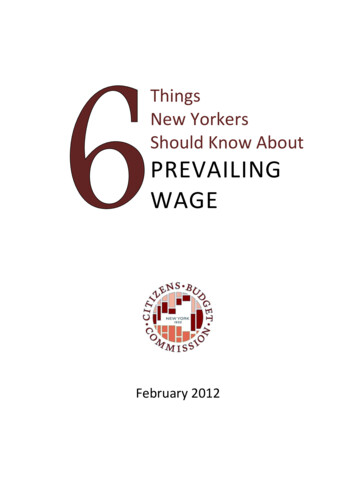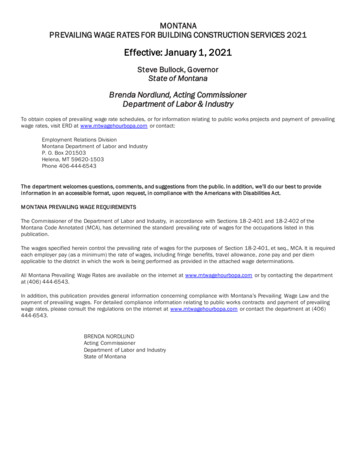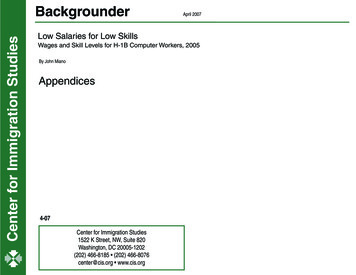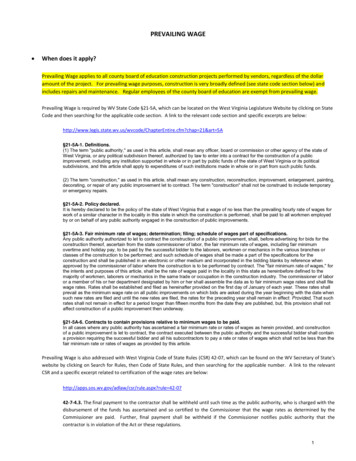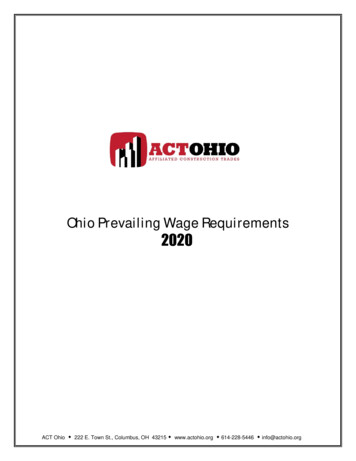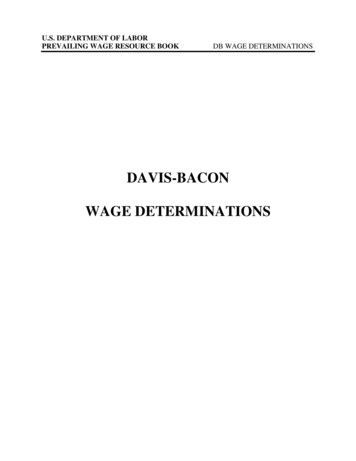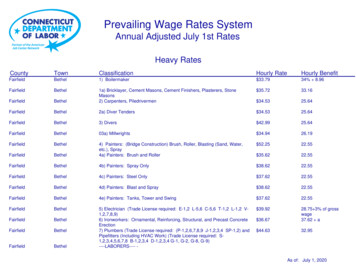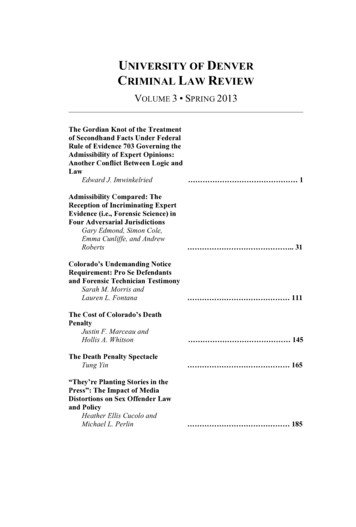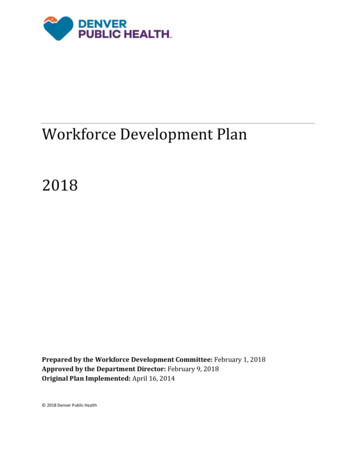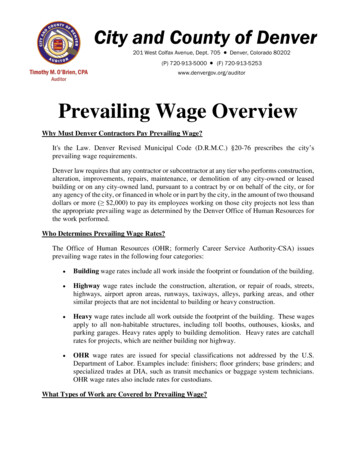
Transcription
City and County of Denver201 West Colfax Avenue, Dept. 705(P) 720-913-5000 Denver, Colorado 80202 (F) 720-913-5253www.denvergov.org/auditorPrevailing Wage OverviewWhy Must Denver Contractors Pay Prevailing Wage?It's the Law. Denver Revised Municipal Code (D.R.M.C.) §20-76 prescribes the city’sprevailing wage requirements.Denver law requires that any contractor or subcontractor at any tier who performs construction,alteration, improvements, repairs, maintenance, or demolition of any city-owned or leasedbuilding or on any city-owned land, pursuant to a contract by or on behalf of the city, or forany agency of the city, or financed in whole or in part by the city, in the amount of two thousanddollars or more ( 2,000) to pay its employees working on those city projects not less thanthe appropriate prevailing wage as determined by the Denver Office of Human Resources forthe work performed.Who Determines Prevailing Wage Rates?The Office of Human Resources (OHR; formerly Career Service Authority-CSA) issuesprevailing wage rates in the following four categories: Building wage rates include all work inside the footprint or foundation of the building. Highway wage rates include the construction, alteration, or repair of roads, streets,highways, airport apron areas, runways, taxiways, alleys, parking areas, and othersimilar projects that are not incidental to building or heavy construction. Heavy wage rates include all work outside the footprint of the building. These wagesapply to all non-habitable structures, including toll booths, outhouses, kiosks, andparking garages. Heavy rates apply to building demolition. Heavy rates are catchallrates for projects, which are neither building nor highway. OHR wage rates are issued for special classifications not addressed by the U.S.Department of Labor. Examples include: finishers; floor grinders; base grinders; andspecialized trades at DIA, such as transit mechanics or baggage system technicians.OHR wage rates also include rates for custodians.What Types of Work are Covered by Prevailing Wage?
Prevailing wage requirements apply to all construction, alteration, improvements, repairs,maintenance, or demolition work performed on city projects.Specific applicable prevailing wage classifications and rates are available on the DenverAuditor’s website rminations.html .OHR clarifications regarding the scope of specific classifications, including hauling andtrucking are available html .What are Certified Payrolls?Certified Payrolls are payroll reports contractors and subcontractors must submit weekly onlinethrough the LCPtracker Client Log-In tab at www.LCPtracker.com.The LCPtracker system is a paperless, online system for filing certified payrolls. Allcontractors performing work on city projects are required to use LCPtracker. All projectspecific wage rates and classifications are assigned to projects by prevailing wage investigatorsbefore a contractor needs to file his or her first report, allowing the contractor to choose specificrates and jobs from an online menu.When a contractor is awarded a city project, the prevailing wage investigator assigned to theproject will perform the initial project setup in LCPtracker. The prime or general contractor isresponsible for assuring all subcontractors performing work on the project are appropriatelyadded on LCPtracker.If a city contractor experiences problems using LCPtracker, please contact the DenverAuditor’s Prevailing Wage Division at 720-913-5018.How do City Contractors Comply with Denver’s Prevailing Wage Fringe BenefitRequirements?Prevailing wage rates include both hourly base pay and fringe benefit amounts. Citycontractors must pay their employees the total of both the base pay and fringe benefit amountsfor each hour worked on a city project, including any overtime hours worked.The Denver Auditor’s Office Prevailing Wage Division must approve all fringe benefitsoffered by any contractor working on a city project. If a city contractor offers fringe benefits,they must submit the following to the Prevailing Wage Division for approval: Medical, dental, disability, life, or any other health and welfare insurance – a copyof the policy including evidence of the portion of the benefit paid by the employer;2
Pension plans - IRS qualification letter, a copy of the plan, including name of anythird-party administrator, and evidence of the portion of the contribution paid by theemployer; Vacation, holiday, or sick pay – a copy of the employer’s policy.To calculate fringe benefit values, the Prevailing Wage Division will provide city contractorsa Fringe Benefit Spreadsheet to complete. The Prevailing Wage Division calculates the valueof fringe benefits based on 2,080 hours per year or 173 hours per month.Additional Fringe Benefit Requirements For sick, vacation, or holiday time to be approved as a fringe benefit, an employercannot have a “use it or lose it” or forfeiture policy that reduces an employee’s earnedbenefit when the benefit is not used. If an earned benefit cannot be carried forward, theemployer must pay his or her employees for the unused benefit. If an employer requires an employee to work the day before or after a holiday to qualifyfor holiday time or pay, then the accrued holiday time or pay does not qualify as afringe benefit. If an employee’s employment ends for any reason, his or her employer must pay theemployee for all accrued sick, vacation, or holiday time. Employers must fund pensions, 401(k) plans, simple IRAs, and other retirementprograms quarterly for those programs to be approved as a fringe benefit. Employers must pay apprentices full fringe benefits unless the approved apprenticeprogram specifically addresses fringe benefit contribution.How do City Contractors Comply with Apprentice Requirements?Employers are required to identify all apprentices working on city projects, the apprentices’craft, and the applicable wage percentage on the LCPtracker payroll report.Example: John Smith, Operating Engineer, Group 3, 80%.All apprentices must be enrolled in an apprenticeship program registered with the U.S.Department of Labor, Bureau of Apprentice Training (BAT). Employers must provide thePrevailing Wage Division current BAT Certificates for all apprentices working on cityprojects. Employers should upload BAT Certificates onto LCPtracker as an eDocument.Employers are required to employ apprentices at a 1:1 ratio with journeymen at all times oncity projects. Any violation of this requirement will result in the violating employer beingrequired to pay journeymen rates to all out of ratio apprentices.Apprentice classifications are assigned on an as-needed, per-project basis. The first-yearapprentice classification is the level of apprentice classification assigned in LCPtracker. If an3
apprentice classification is missing from a project in LCPtracker, please contact the PrevailingWage Investigator assigned to project.How Should City Contractors Pay Their Employees?Pursuant to Denver law, employers are required to pay all prevailing wage employees workingon city projects on a weekly basis for all hours worked. Only janitorial, window washing, andLiving Wage employees are exempt from this requirement. Janitors and window washers mustbe paid no less frequently than every 14 days.Cash payments are not allowed. If employers make cash payments, the employer will berequired to repay his or her employees by check.Employers are required to report the wages and hours of salaried employees performing anyhands-on, non-administrative work as part of his or her certified payroll reports. To evaluatingprevailing wage compliance, salaried employees’ hourly rates are calculated by dividing his orher annual gross salary by 2,080 hours. If the salaried employee’s hourly rate does not equalthe prevailing wage for their respective job classification, they must be paid an additionalamount to make up the difference. If a salaried employee is performing hands-on work andworks more than forty ( 40) hours on a city project, they must be properly compensated forany overtime worked.How are Employee Classifications Determined?Employees are classified according to the work they perform, not by an employee’s job title.Employees often perform work under more than one wage classification during a single payperiod. Employers are required to pay their employees the appropriate wage for any workperformed under all applicable wage classifications. Daily time cards signed by the employeedetailing the work performed are recommended.Employers should familiarize themselves with the scopes of work and limitations adopted byOHR for all prevailing wage classifications, including limitations on the use of commonlaborers as depicted in the OHR Clarification Document available html .How do City Contractors Comply with E-verify Requirements?Denver law requires all city contractors to attest and electronically verify (“e-verify”) theiremployees are lawfully employed in compliance with city, state, and federal law. Employersare required to e-verify all employees working on a city project through LCPtracker. Denverlaw grants the Auditor’s Office authority to request evidence of lawful employment from anycity contractor and his or her employees.How do City Contractors Report Work Performed by the Owner of a Company?4
Owners of a company performing work (“Owner-Operators”) on a city project are exemptfrom paying themselves prevailing wages. However, owner-operators must submit his or herhours worked and all hours worked by any of his or her employees in LCPtracker.To establish ownership, a city contractor must provide (1) Affidavit Contractor PerformedWork Personally (“Owner-Operator Form”) and (2) documentation of sole proprietorship,corporation, partnership, or limited liability company; trade name registration; articles ofincorporation; or IRS Form 1040 Schedule C; or vehicle registration and certificate ofinsurance (limited to trucking contractors).The Owner-Operator Form and appropriate documentation must be submitted as eDocumentsin LCPtracker with a contractor’s first certified payroll. Prevailing wage investigators mayask an Owner-Operator to provide additional supporting documentation. The Owner-OperatorForm is available /Portals/741/documents/PW General/OwnerOperator Affidavit 050217.pdfWhen is a City Contractor Required to Pay Overtime?City contractors are required to pay their employees reported as working on a city project timeand half for all hours worked over 40 hours ( 40) in a seven-day period, whether those hoursworked in excess of forty hours were performed on a city project.The overtime rate is the higher of one and half times the prevailing wage rate, or theemployee’s established hourly rate of pay. An established hourly pay rate includes, cash inlieu of fringe reported as a part of an employee’s regular wages on LCPtracker.How Should a City Contractor Address Noncompliance Identified in a Certified Payroll?City contractors billing the City for work performed on a project subject to prevailing wage,including any subcontractors must report all hours worked in LCPtracker for the period billed.Failure to report hours worked or to otherwise comply with any prevailing wage requirementmay result in the Prevailing Wage Division withholding an application for payment untilprevailing wage requirements are met. The prevailing wage investigator assigned to a projectwill inform any non-compliant contractor and the prime or general contractor of anyunresolved prevailing wage issues.Prime or general contractors may view any subcontractor’s rejected payroll reports inLCPtracker. A prime or general contractor may request administrator or prime approvalaccess from the Prevailing Wage Division on LCPtracker to allow him or her to review orapprove his or her subcontractors’ payrolls.Do not hesitate to contact your project’s prevailing wage investigator to discuss any prevailingwage issues on the project.Are there Penalties for Failing to Comply with Prevailing Wage Requirements?5
Effective January 1, 2017, the City may impose penalties on employers who fail tocomply with prevailing wage requirements. These penalties apply to the underpayment ofemployees and to failure or false reporting on a certified payroll.Underpayment PenaltiesThe Prevailing Wage Division may assess the following fines for underpayments notremedied within 30 days of notice of violation: Fifty dollars ( 50.00) per week per employee for the first violation; Seventy-Five dollars ( 75.00) per employee per week and a two thousand fivehundred dollar ( 2,500.00) fine for the second offense within the previous threeyears; One hundred dollars ( 100.00) per employee per week and a five thousand dollars( 5,000.00) fine if a contractor has had three or more penalties in the previous threeyears.Reporting PenaltiesThe Prevailing Wage Division may assess the following fines for underpayments notremedied within 30 days of notice of the violation: Five hundred dollars ( 500.00) per week for each week during which a contractoror subcontractor fails to furnish any certified payrolls where any worker, laborer,or mechanic employed by the non-reporting contractor or subcontractor hasperformed any work; Fifty dollars ( 50.00) per week for each incident of false reporting on a certifiedpayroll, not corrected within 15 days of the date the false report was brought to theattention of the contractor or subcontractorThis penalty shall be imposed in addition to the other fines. Penalties shall be paid to the Cityand County of Denver.In addition to these fines, employers are still required to pay any underpaid wages.Pursuant to D.R.M.C. §20-77, continual violations of Denver’s prevailing wage laws mayresult in debarment of a contractor from working for the city.How does a Contractor Correct Payroll Errors and Underpayments?When underpayments have occurred, contractors are required to amend payrolls and issueunderpayment checks. When the Prevailing Wage Division assesses underpayments dueemployees on a project, the contractor records those amounts on an LCPtracker RestitutionSpreadsheet and includes the following information:1. the employee name, address, Social Security number, and telephone number;6
2. the employee’s job classifications;3. the total hours worked by the employee for each week, including any overtime;4. the restitution amount – the difference between what the employee was paid andwhat the employee should have been paid;5. the difference owed each employee should be broken down by straight time andovertime hours.This required information must be provided for each underpaid employee. The employer isrequired to submit the completed Restitution Spreadsheet through the LCPtracker’seDocuments for the project.Pursuant to D.R.M.C. 20-76, underpayment checks must be made payable to the individualemployee OR the City and County of Denver.Example - Joe Smith or City and County of DenverIncorrectly written underpayment checks will be returned and the employer will be requiredto reissue the checks. Employers may issue an underpaid employee a single underpaymentcheck for multiple weeks of underpayment. If an underpayment check exceeds fifty dollars( 50.00), the employer is required to provide Auditor’s Office the underpayment check fordistribution.Can Prevailing Wage Rates Change During a Project?Prevailing wage rates may increase or decrease annually on projects with performance periodsthat exceed one year. The prevailing wage rates will change the anniversary of the invitationfor bids on the project or the date of the written encumbrance if no bid or proposal issuancedate is applicable.Changes to subcontractor’s prevailing wage rates are based on those contract dates applicableto the prime contractor.Prevailing wage investigators may provide rate changes to the prime or general contractor,however all contractors and subcontractors performing work on a city project are responsiblefor knowing and paying the appropriate prevailing wages.Are Employers Required to Post Prevailing Wage Information at the Jobsite?The prime or general contractor is responsible for displaying Prevailing Wage Posters in bothSpanish and English at the jobsite. The posters should be posted at the jobsite easily accessibleto all employees. Contractors may request posters from the prevailing wage investigatorassigned to the project. Prevailing Wage Posters are also available html .Can the Prevailing Wage Division Withhold Payments to Non-Compliant Contractors?The Prevailing Wage Division may withhold payment to non-compliant contractors.7
Pursuant to D.R.M.C. 20-78, the city shall not pay a contractor’s invoice where the contractorfails to comply with prevailing wage requirements.Can Prevailing Wage Investigators Enter a Jobsite or Interview Employees?Denver law permits the Prevailing Wage Division to take reasonable steps necessary to ensurecontractor compliance with contract terms, including prevailing wage compliance.Reasonable steps may include employee interviews where the work is being performed,worksite photos, and requests for bank records or paystubs.8
Denver Revised Municipal Code (D.R.M.C.) §20-76 prescribes the city's prevailing wage requirements. Denver law requires that any contractor or subcontractor at any tier who performs construction, . contractors must pay their employees the total of both the base pay and fringe benefit amounts for each hour worked on a city project .

